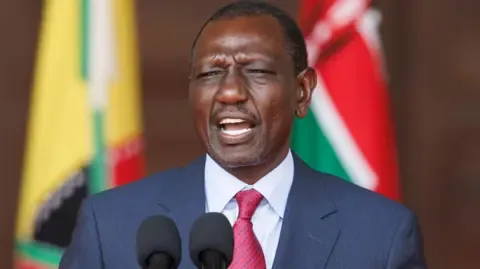Kenya’s president, William Ruto, has announced that he will not sign into law a finance bill proposing new taxes, just a day after protesters stormed parliament and several people were shot dead. The government had intended to raise funds to pay off debt, but the proposal drew widespread criticism from Kenyans who felt it would cause economic pain. Millions of people are already struggling to make ends meet, and the bill would have imposed new taxes and fees on a range of daily items and services, from egg imports to bank transfers. The government has been accused of using excessive force to quash the protests, with at least 22 people reported killed and hundreds injured.
The protests, which were largely youth-led, saw thousands storm parliament and clash with police and security forces. The president had vowed to quash the unrest “at whatever cost,” and the military was deployed to maintain order. However, the actions of the president and the government have been widely condemned, with many calling for greater transparency and accountability.
The Kenyan president, who came to power promising to help Kenyans cope with rising costs, has faced widespread criticism for his handling of the situation. Activists and civil society groups have warned that the protests are not just about the finance bill, but about the broader issues of economic inequality and political marginalization.
One analyst, Herman Manyora, said that the president missed an opportunity to calm tensions and adopt a more conciliatory approach, and instead appeared angry and confrontational. Many young people who had cheered for the president’s economic reforms are now opposed to the pain of the proposed reforms, and have united in their opposition to the bill.

Kenya’s president, William Ruto (Via William Ruto/Twitter)
The fallout from the protests has also seen the use of tear gas and military patrols in the streets, with widespread fears of further violence. The capital, Nairobi, has seen protests in the past, but the current situation is seen as particularly dangerous. The government has been accused of using excessive force to quash the protests, and there have been reports of abductions of people involved in the protests.
In the face of widespread opposition, the president has acknowledged the deaths and offered condolences, but also defended the government’s actions. The opposition leader, Raila Odinga, has condemned the killing of protesters and called for dialogue and a suspension of the constitution.
The situation remains tense, with many Kenyans calling for greater transparency and accountability from their government.
